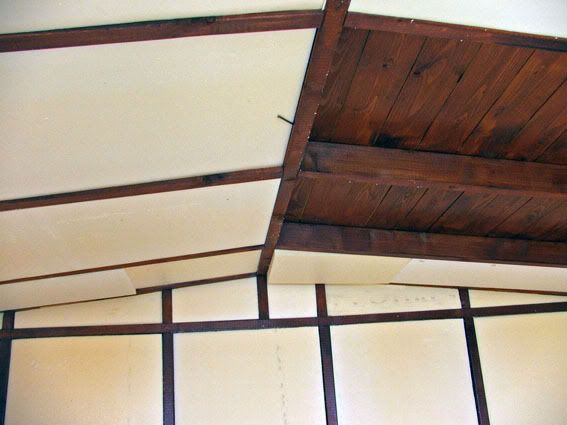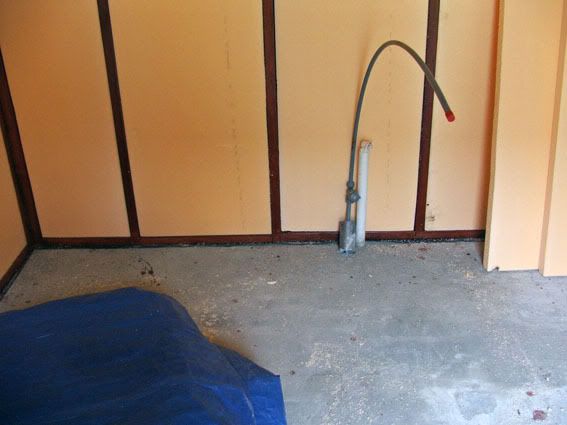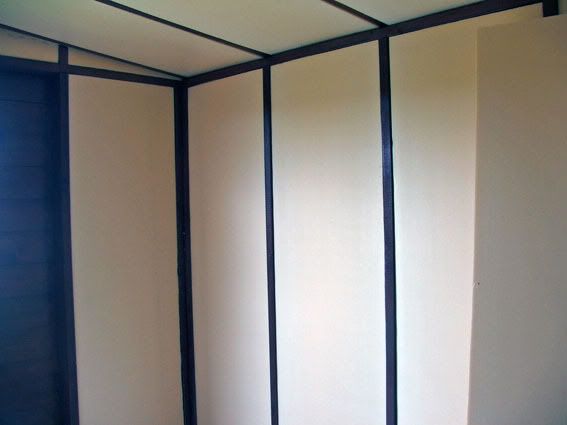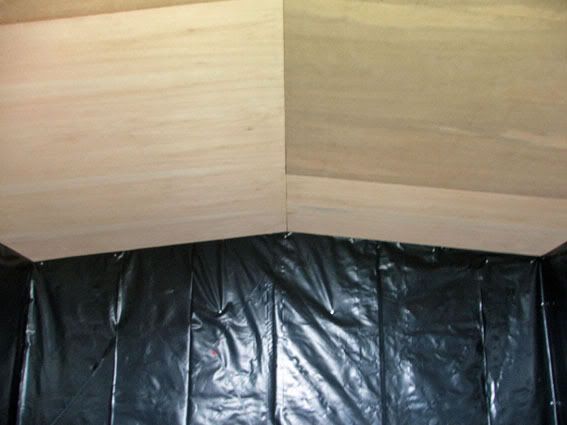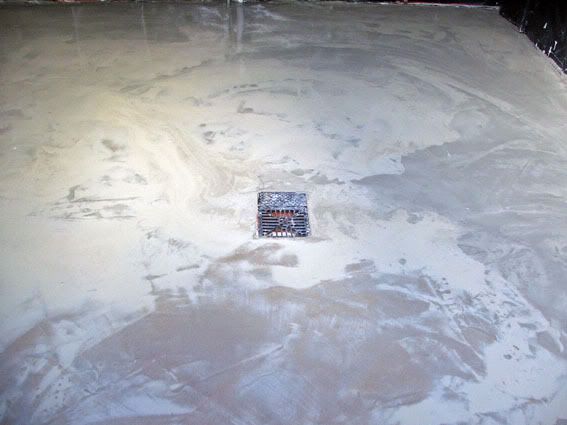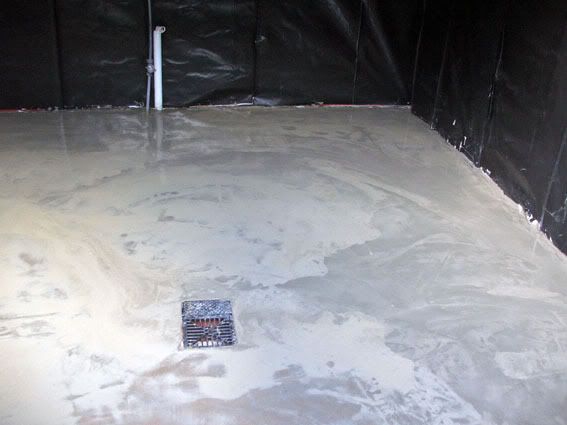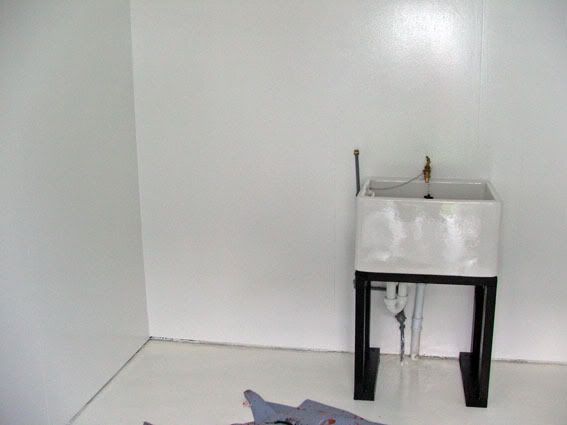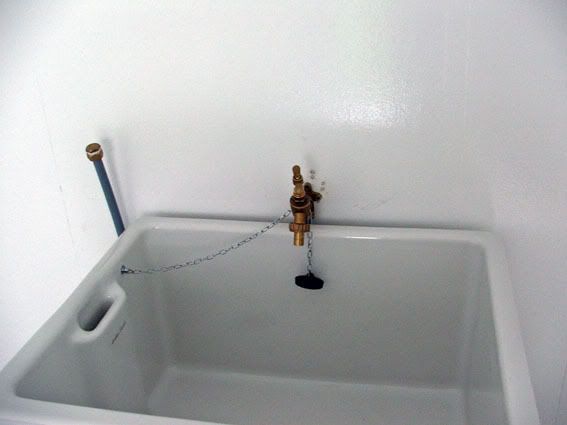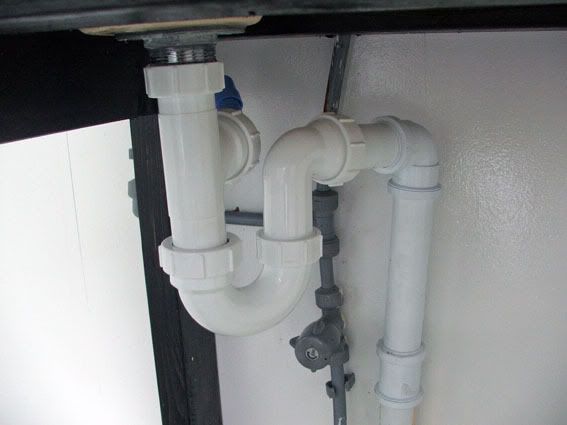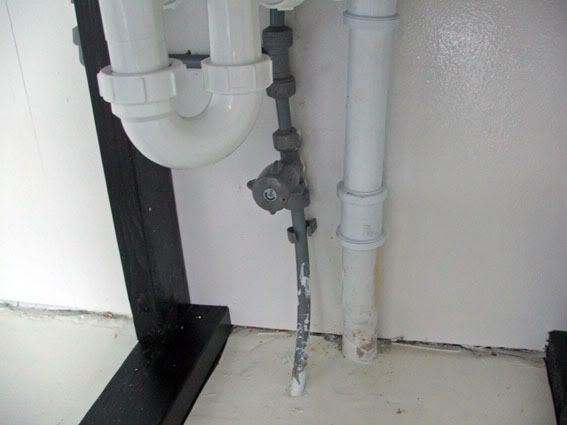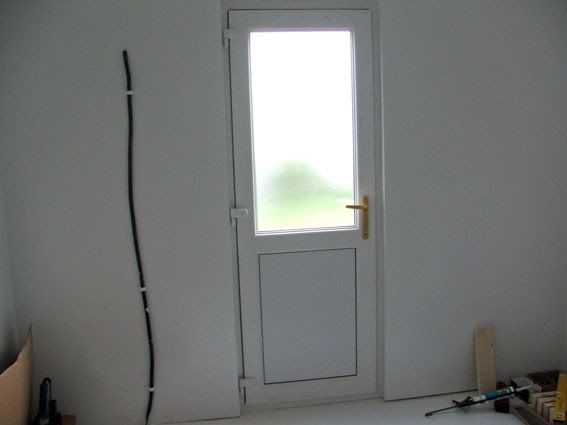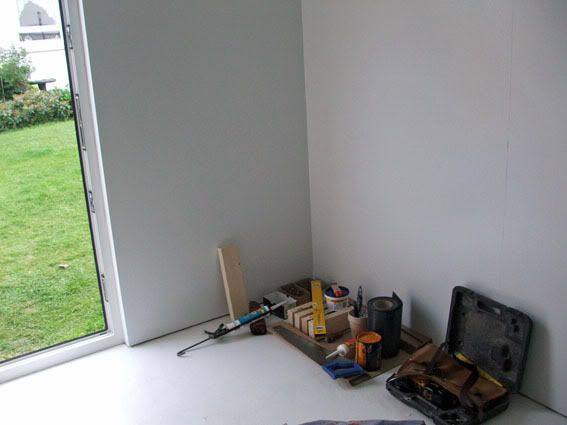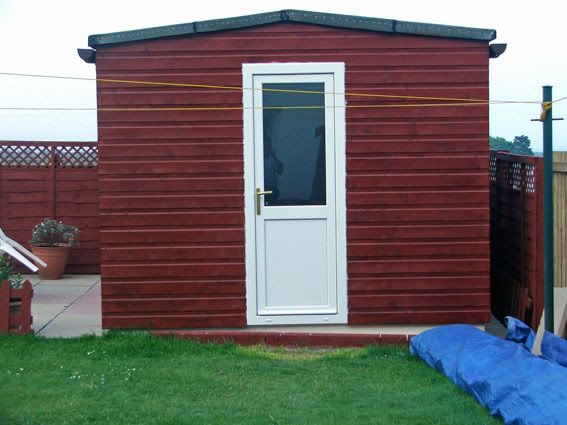Page 1 of 2
Fish Hut.
Posted: 04 Mar 2006, 13:44
by AndrewC
Plan View
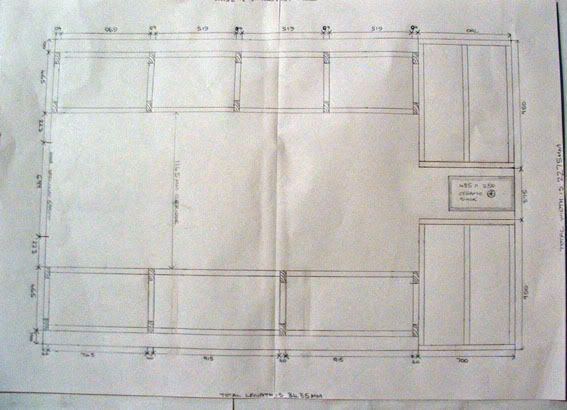
Right Hand Wall
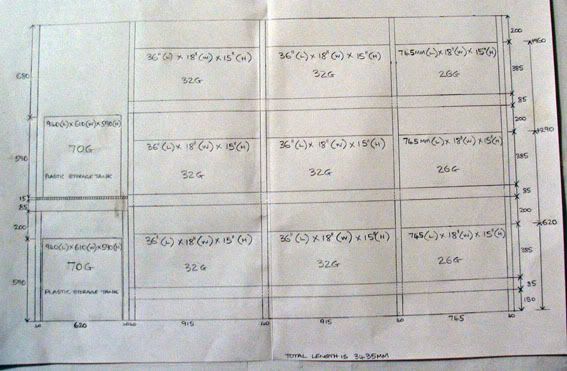
Left Hand Wall
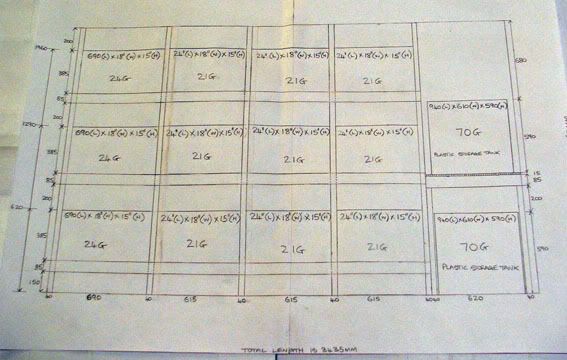
This is the plans for my fish hut, which is approximately 12Ft by 8Ft, with all the tanks in the sketches 15" high.
I am thinking of using air driven sponge filters for the 2 foot tanks which will be for Apistogramma and Fluval 3 (internal filters) plus airstones for the 3 foot tanks which are for my zebra plecs.
I plan to run pvc pipework from each storage tank to the tanks so that when i turn a pump on and then a valve, that tank will fill, but will still be using a python to empty the tanks.
I have thought about centralised filtration for the tanks and had drawn a design with four tanks high, the tanks would only be 12" high and the working area between the top of the tank and the tank above will be less to save the hut being too tall, with the bottom tank sitting on the floor and would be the sump.
I do not fancy one big centralised system as it will mean i can only keep fish that like a certain water parameter.
With the pipework i would be running for filling the tank, would centralised filtration be just as easy, as i would get the holes drilled when ordering the tanks and fit the pipework myself ?
Would one tank of the same dimensions as the three above it, be a big enough sump for the three tanks above it ?
I am trying to make easier in maintance (and i don't mean cleaning a tank), and also be able to have more tanks.
Dos my idea for filteration of the plec tanks seem alright ?
Posted: 04 Mar 2006, 16:37
by CoryWally
Regarding the air driven sponge filters, I run biofoam 200's on my 2 foot tanks. The link below is a good source - £50 for a dozen inc. postage - normally up to tenner each.
http://www.fishathome.co.uk/undergravel ... iofoam.htm
Mark.
Posted: 04 Mar 2006, 17:22
by AndrewC
Thanks Mark
I used to use Biofoam sponge filters on my current tanks, but prefer Aquascope's "Discus Pro" sponges now, though a bit more expensive
http://www.aquascope.co.uk/Products/Dry ... rodID=1035
It's a pity you can't get Hydro Sponges in the UK !
Posted: 04 Mar 2006, 19:27
by CoryWally
Now they look good! Maybe I was a bit hasty with my recommendation!
Good luck with the fish house, your plans are impressive.
Posted: 05 Mar 2006, 03:56
by Owch
Huey Hung Air lift filters are a very good filter and alot cheaper than the Discus Pro ones. One rated for 500lts is about £12.00.
Tom
Posted: 05 Mar 2006, 11:57
by grettonman
What did you intend making the stands out of ?
Posted: 05 Mar 2006, 12:10
by AndrewC
Heuy Hung airlift filters look like hydro sponges to me.
The stand will be made out of 4" by 2" CLS (85mm * 35mm) and stained to protect it.
Posted: 05 Mar 2006, 13:34
by Jools
If you go for fluval 3's then you can do away with the need for airstones if you use the air mixer add-on (included) and habg the filter out of the water a bit. You will however need to ensure the stress bars don't stop you doing this and that the drip tray or glass cover is firm as there will be a lot splashing.
Is that a floor drain I see on the plan?
Jools
PS 2006 might be the year I build my second fishroom!!!
Posted: 05 Mar 2006, 16:46
by AndrewC
Thanks Jools
I am checking to see if Fluvals were decent enough filters for plecs, as when i read about other fish huts/rooms they all seem to be on a centralised filtration, which had me thinking.
Through time i will probably end up with a couple of other species of plecs and don't want to be tied to one specfic water parameter.
I use Fluvals just now and have the add on mixer with a piece of airline tubing so that it sucks in air from outside the tank, so understand what your saying.
Its not a floor drain, it's my attempt at drawing a ceramic sink for using my python on to drain the tanks !
I am going to build a concrete base slab for the hut and will put a drain in the centre, though hopefully things won't get that messy.
Posted: 05 Mar 2006, 16:57
by AndrewC
Jools wrote:
PS 2006 might be the year I build my second fishroom!!!
Hello Jools.
Hope you don't mind some questions about your fish room.
What size is your original fish room and when/if you build a second fish room, would you have a specific size in mind for it.
My 12ft * 8ft hut, leaves my with 1145mm (just under 4ft) in between the two rows of tanks and seems tight ?
What filtration do you use on your tanks ?
Andrew.
Posted: 18 Mar 2006, 15:42
by Jools
My first fishroom was 7ft x 5ft and contained around 14 tanks. It was very compact, but you just learn to move slowly. The fish are happy and you are heating less space.
The new one is still on graph paper but looks to be about 7.3 x 2.5m.
I used mostly internal power filtration, a couple of air driven sponge filters and two bigger tanks with a comination of internal and external power filtration.
Jools
Posted: 19 Mar 2006, 12:11
by AndrewC
Thanks Jools
Your new hut is a good size, you'll have room for plenty of tanks in there.
I decided to alter the width of my hut from 8ft by 10ft to get a bit more room between the tanks.
The height of my hut is 8ft to the eaves and 9ft to the ridge, to give the roof a small pitch for rainwater runoff, and keep getting told i will need permission for a hut that size.
What height are your huts and did you have to get permission to build your first hut ?
Posted: 20 Mar 2006, 11:40
by MatsP
AndrewC wrote:The stand will be made out of 4" by 2" CLS (85mm * 35mm) and stained to protect it.
Just for correctness, I think you'll find that 4 x 2 in metric is 95 x 45mm or thereabouts. 85 x 35 would be 3.5 x 1.5", which is probably also available as a material, but I'd probably go for the 4x2 - that's certainly what I'm planning on using.
Also make sure you use "clever" design to avoid the joining points from shearing [for example: the corner of the vertical side, and the horizontal, you make sure that the horizontal crosses over the upright, and that the upright is short side out - making the longer longer side continue across the bit that goes along the side].
Using waterfast glue to join pieces as well as screws will also help the strength - preferrably the polyurethane glue, rather than waterfast PVA.
--
Mats
Posted: 20 Mar 2006, 18:48
by AndrewC
Hello Mats
I work in the building trade as a joiner (carpenter) and basically what you said is fine, i just think that you paying a lot more for marginally more strength using dressed 4*2 instead of CLS, but if you only need a few lengths of it, you will not feel the extra cost.
Dressed 4*2 in metric is 95mm * 45mm (it's commonly used for door frames), Off Saw 4*2 is 100mm * 50mm (but is too rough and generally used when not seen).
The approx cost of dressed 4*2 is £1.50 per Meter, so one length at 4.8M long will cost £7.20.
4*2 CLS (90mm * 40mm) costs £5 per 4.8M length (in Scotland), it is very popular around here because of it's price and it has a finish though can be a bit knotty, though not as good a finish as dressed timber, saving £2.50 per 4.8M length.
I am using it for the hut walls and roof as well, so will need a quite a few lengths of it.
The rack supports will be fixed at the bottom and into dwangs fitted in the ceiling for steadying the rack, and the tank runners will be checked into the supports as per drawing, and glued and screwed in place.
Have you started your fish room yet ?
Do you want to join me robbing my local bank to pay for everything

Posted: 23 Mar 2006, 21:42
by Jools
AndrewC wrote:What height are your huts and did you have to get permission to build your first hut ?
My first was a fish room, my second is also planned as such. Don't know much about huts with one t!

Architects are coming tomorrow, so might have some news or will start a new post on the subject so as not to hijack this one.
But, to get across the idea, here's me with two 48x30x18 holding tanks I already have in waiting...

Jools
Posted: 25 Mar 2006, 10:52
by AndrewC
Good sized tanks Jools

Are you using dado trunking for the sockets in your fish room or is your electrician making something up for all the sockets you will need ?
Posted: 25 Mar 2006, 10:56
by Jools
AndrewC wrote:Are you using dado trunking for the sockets in your fish room or is your electrician making something up for all the sockets you will need ?
I actually have yet to decide on that. The problem with dado truncking is that water can get into it all too easily. I guess I'm currently favoring the idea of running power cables to cable tidies. Without wanting to hijack this post, I'd be interested to hear others views or solutions here as fish room/hut discussions often centre around moving water rather than electrons.
Jools
Posted: 25 Mar 2006, 11:23
by AndrewC
The electrician i'm using said instead of buying pvc trunking (which is quite expensive
http://www.tlc-direct.co.uk/Main_Index/ ... index.html), i should make some dado trunking using 2" * 2" and 6" rips of 1/2" plywood.
Run the wooden trunking around the top of the hut which keeps it above the tanks and fit the double sockets needed to the plywood and he would join all the sockets in a loop, though depending on the amount of sockets, may have to make a two or three loops run off different breakers because of the load.
For the bottom tanks i think i will need to use some four plug extensions as the appliance cables will be too short.
That is just my idea as i have still to speak to the electrician again.
Posted: 25 Mar 2006, 11:34
by Jools
Heh, the electrician I spoke to recommended against running a power track along the top of the room for condensation reasons (i.e. there is more of it up there) that said, we were discussing PVC and not plywood tracking.
I was going to run power down from the tracking (somewhere around 1/2 to 2/3 up the wall) to cable tidies (for pumps and heaters) but have separate power for lights.
The separate power for lights was because of two ideas. (a) So I can put it on one big timer and (b) my extended plans would allow a backup generator to run "life support" (i.e. heat, air and filtration) but not non-essentials such as lights.
Jools
Posted: 25 Mar 2006, 11:48
by AndrewC
Personally i think you are better with trunking, whether it is wood or pvc and try to eliminate as much condensation as possible, using ideas, such as Corymans method in the following link
http://www.planetcatfish.com/forum/view ... c&start=15
Posted: 25 Mar 2006, 12:22
by Kana3
Andrew, have you thought of having a well in your slab? That would allow you to position your racks on the lower level, and you can keep your roof under the permit height. (I'm assuming you'll also have a floor drain).
Of course that's a bit more shovel work, before your concrete goes in.
Posted: 27 Mar 2006, 11:57
by MatsP
Ok, [IANAL]If I understand the current rules on electrical installations correctly, you can wire anything up anyway you want [at leaast, you don't need to have an electrician do it - obviously, if you short the live and neutral or connect either of those to earth, you have a bit of a problem], as long as it ends in a plug. So my plan, for my fish-hut [existing brick-built shed on the property]: Electrician wires in two or four double sockets [not sure of exact number] and then I'll build my own "extension lead" using double sockets wired to a flex with a plug to go into the sockets. Obviously, the power requirements in a small fish-hut may still be quite large, so a 30A+ mains circuit is probably a good idea.[/IANAL]
30A * 230V => just under 7kW, which should be sufficient for quite a few heaters/lights [and bear in mind that all heaters are normally not on at the same time].
As to power-generator: I'd probably go for a decent UPS system rather than a petrol/diesel-driven generator. Engines like that prefers to be used relatively frequently, not just once every two or three years [aside from the fact that the UPS doesn't annoy any neighbours, etc].
--
Mats
Posted: 27 Mar 2006, 16:25
by AndrewC
Mats
You can run internal wires in a house yourself, but if you have to connect to fuse box you really need get a qualified electrician to do so.
Just check over what ever you do with the electrican that is fitting the sockets for you, he'll keep you right.
Only know this because the electrician i work beside now and then, moans about having to go to college a couple of days each year to keep up to date with new legislation and to keep his certificates up to date, losing a couple days work through it.
Had not really thought about a back up generator, any power cut here only lasts a hour or two and the fish have survived any previous power cut.
Will need to price them, found this on a quick search
http://www.generators.co.uk/
Posted: 27 Mar 2006, 19:19
by MatsP
Thanks for the info on electrics. I've heard several different things about how the current electrical stuff works - I understood something SIMILAR to what you said, but it gets extra complicated since my hut needs a separate consumer unit, so essentially anything inside it will be off a new consumer unit - I guess I can still stuff new sockets onto the existing ring tho'. [And have it checked by someone qualified].
If you run a UPS, you can run a few air-lines through the UPS, and maybe a few filters too. As long as the power isn't off for MANY hours, it should do you fine. Temperatures will drop, but it takes quite some time with delta-T of less than 20'C to drop a 25'C to (say) 20'C - and your delta-T for the room will be much lower than 20'C - so you're looking at a slower reduction in temps. So heaters don't REALLY need to be run on external power - unless you expect to cope with longer than a few hours of power-loss [say 6-8 hours]. Which is nice to cope with, but gets complicated and costly.
400 odd quid gets you one of these:
http://www.dabs.com/productview.aspx?Qu ... 2#infoarea
[That's the first one in the 300-499 range that I found, so there's perhaps other better options].
It runs 1500 VA for 7.4 minutes. Say you load it with 150W (for easy calculation), it will do roughly 74 minutes of operation. Which makes it a pretty good option. The cost is about the same as a higher end generator.
But the generators need someone there to start them.
Of course, if you have a long power-cut, you need something different... Then a generator is certainly the only option.
--
Mats
Posted: 09 May 2006, 19:16
by AndrewC
Some pictures of how the fish hut is going, the original drawings of the tanks has now changed, the tanks are now all 12" high, but the racks are four high to accomodate sump filtration for the zebra tanks.
Missed pictures of some stages as by the time i was finished at night it was getting dark.
Slabs removed, the area is ready for shuttering and the concrete base to be poured.
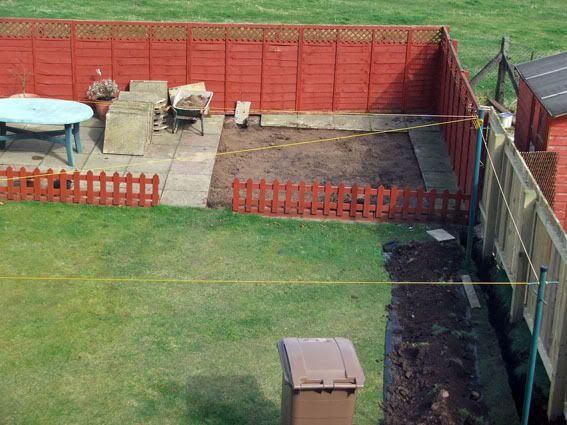
Trench dug out to run the power cable and water pipe in.
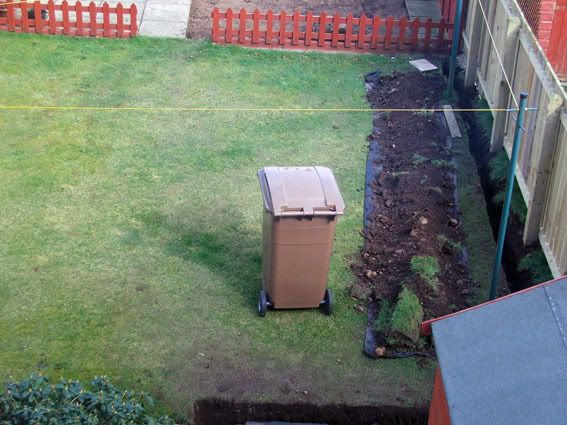
Trench dug out to run the power cable and water pipe in.
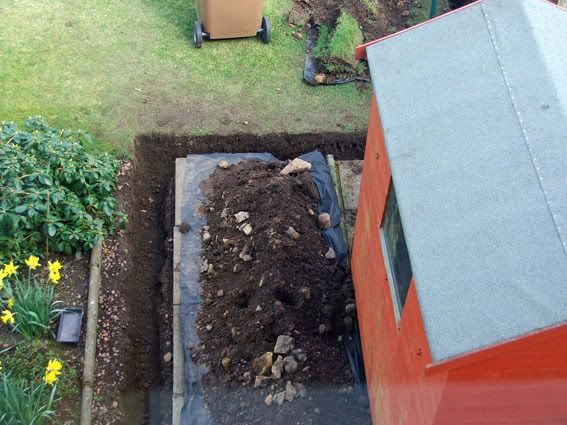
After pouring the base the wall and roof framing is next.
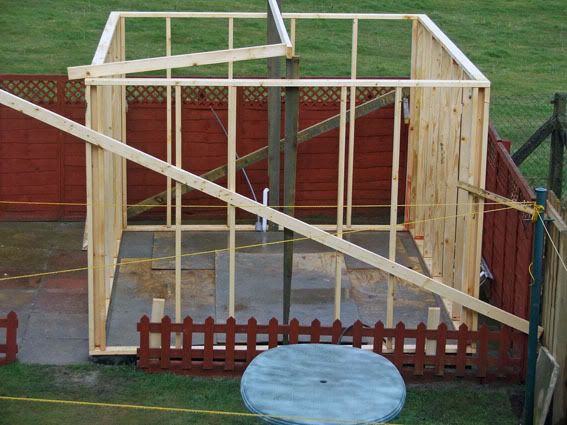
The roof is then lined.
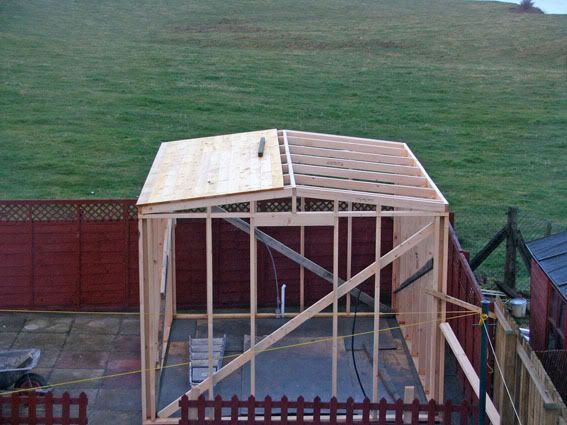
Close up of the framing.
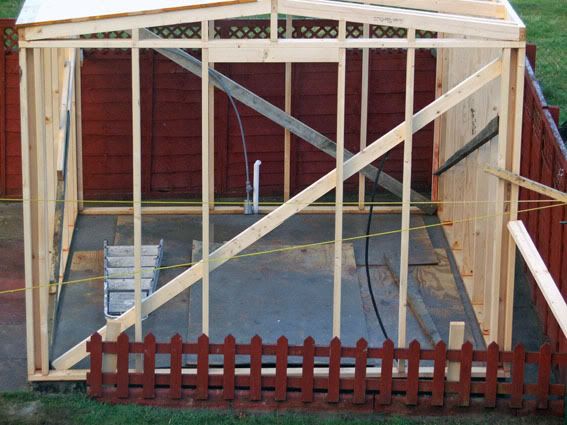
The hut is now cladded and sealed with underfelt.
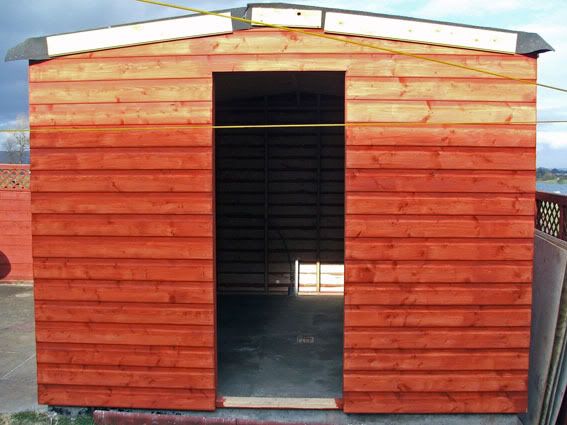
Hut framework.
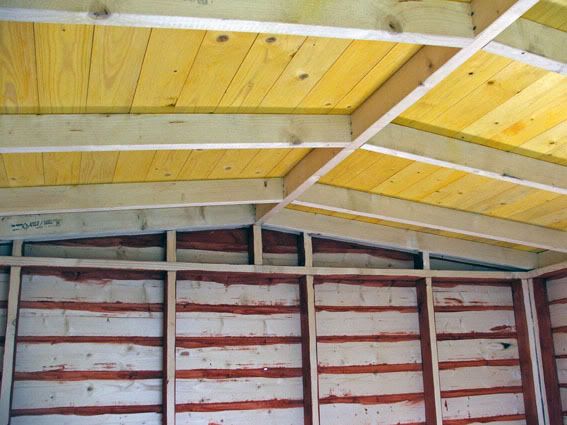
Floor drain in middle of the concrete floor for emergencies.
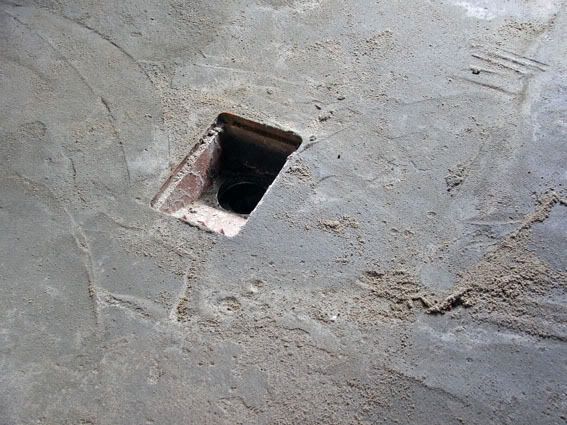
Water supply run using HEP-2-O plastic pipe and the waste pipe is run to a soakaway in the field behind the hut.
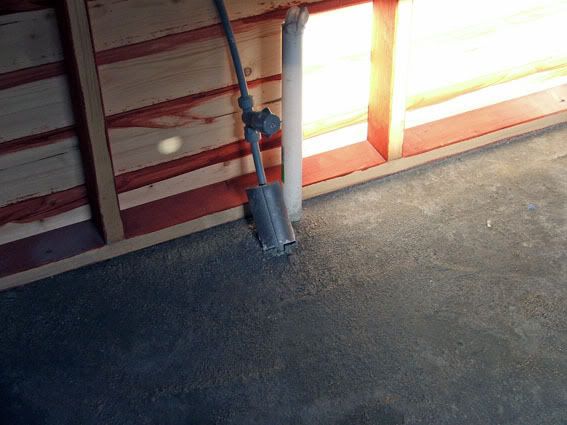
16mm Steel Wired Armoured cable to supply the power to the hut.
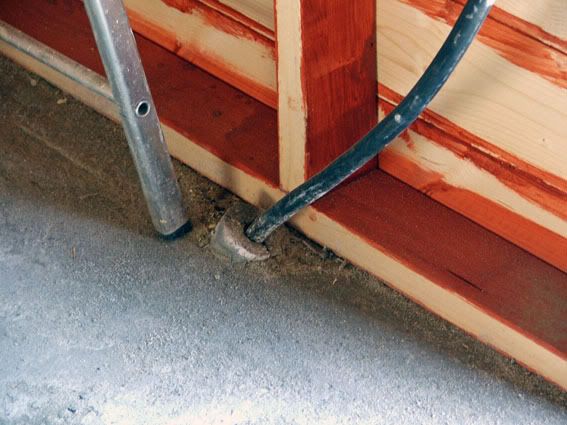
Hut framework.
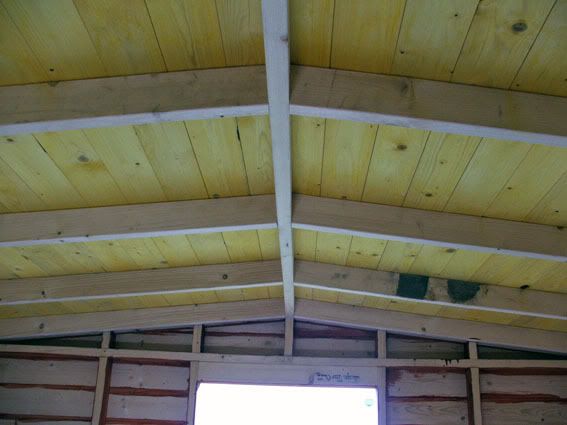
The hut sealed properly with Torch On Felt.
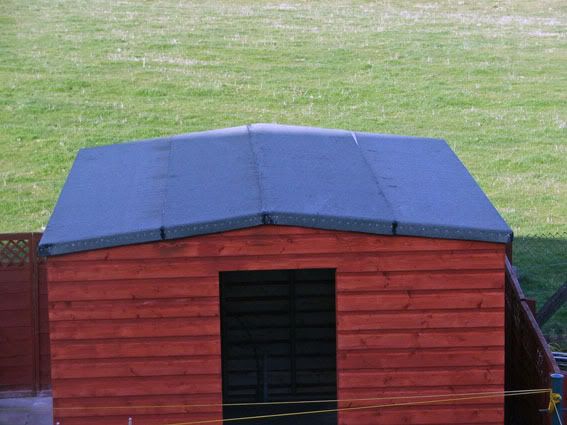
Still to; fit a gutter, a PVC Door, insulate the walls, vapour barrier the walls and line the walls with plywood.
Will be running three levels of wood truncking right around the internal walls of the hut for the sockets (pvc trunking is far too costly), as i need approx 44 double sockets, which will be run off the hut's own fuse box.
Posted: 09 May 2006, 19:55
by MatsP
Looks good.
I'll try to get photos of my fish-hut when I get going on that - still got plenty of work left on the house itself yet... Got a kitchen to install this weekend (will probably have plenty left for AFTER the weekend too).
--
Mats
Posted: 21 Jun 2006, 01:44
by redzebra24
wow looks sweet
Posted: 22 Jun 2006, 02:31
by KevinM
I just use the front room but its got a wooden floor with floorboards,so Im not sure about if stacked tanks 3 or more high would work safely on that floor or not.
I currently have 11 tanks in there.Its not really a fish house but I call it my fish room as its mostly fish in there.I also have 2 tanks in the lounge and a small one (7gallons)in the kitchen.
I've only had the larger number of tanks a couple of years so I dont really have any organised program of use yet.
Before that I always just had one 20 gallon, not the same 20 gallon tank.
For the sink I would suggest a butler sink.
Its similar to the traditional London or the Belfast pattern sinks.It differs in that the butler sink is long and narrow is ideal for space saving it comes out from the wall only one third or one half of the belfast sink size but is the same depth.
I'd suggest a 2 or 3ft one with 5 taps above it , 3 cold and 2 hot.
Then you can run 2 pythons at the same time,the final cold tap is just incase you may wish to make a cup of tea or do something else.
Kevin
Posted: 22 Jun 2006, 12:47
by AndrewC
Posted: 22 Jun 2006, 13:25
by MatsP
Looking good. When's the fish coming in?
--
Mats




















